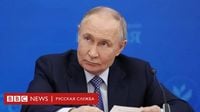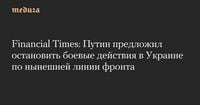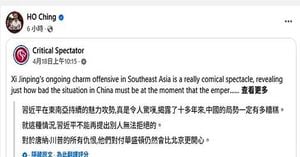In a surprising turn of events, Russian President Vladimir Putin has proposed to halt hostilities in Ukraine along the current front line, according to the Financial Times, which cited three sources familiar with the discussions. This proposal marks a significant shift in the ongoing conflict, as it is the first official indication in nearly three years that Putin may be willing to abandon his maximalist demands to end the fighting.
The proposal was made during a meeting in early April 2025 between Putin and Trump's special envoy, Steve Witkoff, in St. Petersburg. During this meeting, Putin mentioned that Moscow might consider waiving its claims to certain parts of the occupied Ukrainian regions that remain under Kyiv's control. Following this, the United States reportedly put forward ideas for a potential settlement, which included recognizing Crimea as Russian territory and acknowledging Moscow's de facto control over parts of four regions.
However, European officials who are familiar with the U.S. efforts to resolve the conflict have expressed skepticism regarding Putin's intentions. They believe that this seemingly conciliatory offer could be a tactic to lure Trump into accepting additional Russian demands, which could then be imposed on Ukraine as faits accomplis. One source told the Financial Times, "There is now great pressure on Kyiv to give up some positions so that Trump can declare victory."
Kremlin spokesman Dmitry Peskov confirmed to the Financial Times that "intense work is underway" regarding negotiations with the U.S. He stated, "We are negotiating with the American side. The work is difficult and takes a lot of time, so it is difficult to expect immediate results, and it is impossible to make it public." This reflects the complex dynamics at play as the U.S. navigates its role in the conflict.
As the discussions unfold, there is hope that a resolution could be reached by April 30, 2025, allowing Trump to claim a diplomatic victory within the first 100 days of his presidency. Negotiations between the U.S., Ukraine, and its European allies are scheduled to take place on April 23, 2025, in London. Ukrainian President Volodymyr Zelenskyy has indicated that representatives from Great Britain, Germany, and France will also be present.
However, Zelenskyy has firmly stated that Ukraine will not recognize the legal occupation of Crimea. During a press briefing, he emphasized, "This is our territory, the territory of the people of Ukraine. There is nothing to talk about - this is beyond our Constitution." His comments come in the wake of reports that the Ukrainian and European delegations will face a U.S. proposal to recognize Crimea as Russian and freeze the front line.
On April 22, 2025, U.S. State Department representative Tammy Bruce announced that Secretary of State Marco Rubio would not attend the London meeting, citing his busy schedule. Instead, the U.S. will be represented by Trump's special envoy Keith Kellogg. Additionally, Financial Times correspondent Christopher Miller reported that Witkoff would also not be in London, as he plans to visit Moscow for further discussions with Putin.
In a related development, Putin expressed his willingness to engage in direct negotiations with Ukraine, contingent upon certain conditions. He indicated that Russia is open to discussions about mutual non-attacks on civilian infrastructure. Zelenskyy did not directly respond to this comment but reiterated that Ukraine is prepared for any conversation that guarantees the safety of civilians.
Putin's remarks came on April 21, 2025, following Zelenskyy's proposal to suspend attacks on civilian infrastructure in both Ukraine and Russia. This initiative was born from recent negotiations in Saudi Arabia, where both countries agreed to refrain from attacking each other's energy facilities for 30 days. Despite this agreement, violations were reported daily.
During the March negotiations, Ukraine had also suggested a complete ceasefire for 30 days, but Russia's conditions were deemed unacceptable by Kyiv and its Western allies. Putin's recent comments suggest a shift in tone, as he stated, "Russia has always been positive about any peace initiatives," and expressed hope that Kyiv's representatives would reciprocate.
Peskov clarified that Putin's comments indicate a readiness for direct negotiations, specifically on the topic of refraining from strikes on civilian targets. He stated, "When the president spoke about the possibility of discussing the topic of not inflicting strikes on civilian objects, including on a bilateral basis, the president specifically meant in the form of negotiations and discussions with the Ukrainian side."
Historically, Russian officials, including Putin, have been reluctant to engage in direct negotiations with Ukraine, frequently questioning Zelenskyy's legitimacy. They have claimed that his powers are expiring and that new elections have not been held, despite these assertions contradicting the Ukrainian Constitution, which prohibits elections during wartime. No other country or international organization questions the legitimacy of Ukrainian state institutions.
In his evening address on April 21, Zelenskyy reaffirmed Ukraine's commitment to minimizing strikes on civilian infrastructure, stating, "We are waiting for a clear response from Moscow. We are ready for any conversation, as long as it ensures security." He also referenced the recent "Easter truce" proposed by Putin, noting that there were no air raid alerts during the holiday and that some front lines experienced periods of silence.
Zelenskyy has suggested new agreements that would prevent any strikes using drones and long-range missiles on civilian infrastructure for at least 30 days. Putin responded that this idea would be thoroughly examined, indicating a willingness to discuss the proposal further.
Despite these developments, Putin justified recent strikes on civilian targets, claiming they were necessary when military personnel were present. He referenced a missile strike in Sumy that resulted in civilian casualties, arguing that military ceremonies were taking place at the affected location.
Such statements raise significant concerns regarding compliance with international law, as the Geneva Conventions dictate that a civilian object can only be considered a legitimate military target under specific conditions. The latest known direct negotiations between Russia and Ukraine occurred in Istanbul and Belarus shortly after the onset of the full-scale invasion.
As the situation evolves, U.S. representatives have indicated a willingness to intensify their efforts to resolve the conflict. Following recent negotiations in Paris involving the U.S., Ukraine, and European countries, Secretary Rubio warned that Washington would abandon its peace efforts if no progress is made in the coming days. The U.S. has proposed a plan to Kyiv that includes recognizing the annexation of Crimea and Ukraine's commitment to refrain from joining NATO. This plan is expected to be a focal point in the upcoming discussions in London on April 23, 2025.
If an agreement is reached, it is likely that another visit by U.S. Special Envoy Steve Witkoff to Russia will follow, as both sides seek to navigate the complexities of this ongoing conflict.





